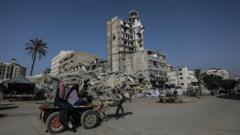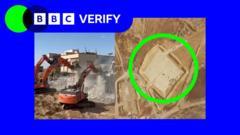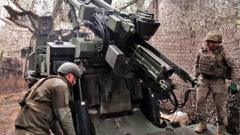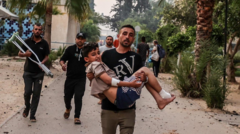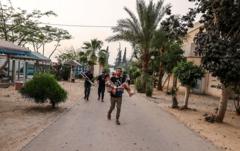The latest Israeli airstrikes in Gaza have claimed the lives of at least 80 individuals, with hospitals reporting a significant number of casualties including children. This development comes amidst urgent calls from the UN for action to alleviate the humanitarian crisis, highlighting the dire situation faced by civilians in the region.
80 Lives Lost in Overnight Israeli Strikes on Gaza Amid UN Humanitarian Appeals
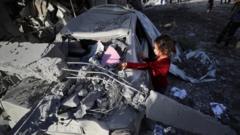
80 Lives Lost in Overnight Israeli Strikes on Gaza Amid UN Humanitarian Appeals
Israeli airstrikes in Gaza result in numerous casualties, stirring international concern over humanitarian conditions and potential war crimes.
Article Text: At least 80 people, including many women and children, have lost their lives in a series of Israeli airstrikes across Gaza, according to reports from local hospitals and rescuers. The Indonesian hospital documented 22 children and 15 women among the fatalities in northern Jabalia, where several residential buildings were struck overnight. The al-Awda hospital confirmed receiving the remains of another nine individuals, predominantly children.
The Israeli military clarified that the strikes were aimed at Hamas and Palestinian Islamic Jihad operatives in the region. Prior to the attacks, the military issued evacuation warnings to residents of Jabalia and surrounding areas following rocket fire into Israel. This operation coincided with UN humanitarian chief Tom Fletcher’s urgent call for the Security Council to act to prevent what he termed "genocide" in Gaza, criticizing Israel's blockade and planning for aid distribution via private entities.
According to Israel’s UN representative, these accusations lack merit, arguing that the current aid framework is ineffective as it enables support for Hamas's military activities. Residents of the Jabalia town described multiple explosions overnight as smoke and flames engulfed the skyline, with distressing visuals circulating online reflecting the devastation.
Eyewitness Hadi Moqbel recounted the loss of family members, including a two-month-old baby, amid the chaos. The director of al-Awda hospital expressed the challenges in managing the influx of injured individuals due to shortages of medical supplies and ongoing fuel constraints exacerbated by the conflict.
The conflict has intensified with reports of multiple evacuation notices issued for various northern sectors, citing the presence of Hamas in civilian dense areas. In a dramatic escalation, the UN has indicated that 20% of Gaza's population has been displaced and that food and fuel shortages have impacted essential services, including community kitchens.
The international community continues to press Israel to comply with its legal obligations toward Gaza's civilian population. Simultaneously, a political dimension unfolds with indications of a possible ceasefire following the release of an Israeli-American hostage by Hamas, an action perceived as a goodwill gesture.
US President Donald Trump's engagement in the Middle East has underscored the escalating hostage situation, with his administration seeking the release of remaining captives as a precondition for peace. Meanwhile, Israel has reiterated its commitment to continue military operations against Hamas, vowing to maintain pressure on the organization.
Casualties from the escalating airstrikes, including a recent attack on a hospital in Khan Younis that killed at least 28, signal a deepening humanitarian crisis in Gaza since the military campaign commenced on October 7, following a deadly cross-border attack. As the situation evolves, the toll on the civilian population remains a focal point of international concern, bringing urgent humanitarian needs to the forefront.
The Israeli military clarified that the strikes were aimed at Hamas and Palestinian Islamic Jihad operatives in the region. Prior to the attacks, the military issued evacuation warnings to residents of Jabalia and surrounding areas following rocket fire into Israel. This operation coincided with UN humanitarian chief Tom Fletcher’s urgent call for the Security Council to act to prevent what he termed "genocide" in Gaza, criticizing Israel's blockade and planning for aid distribution via private entities.
According to Israel’s UN representative, these accusations lack merit, arguing that the current aid framework is ineffective as it enables support for Hamas's military activities. Residents of the Jabalia town described multiple explosions overnight as smoke and flames engulfed the skyline, with distressing visuals circulating online reflecting the devastation.
Eyewitness Hadi Moqbel recounted the loss of family members, including a two-month-old baby, amid the chaos. The director of al-Awda hospital expressed the challenges in managing the influx of injured individuals due to shortages of medical supplies and ongoing fuel constraints exacerbated by the conflict.
The conflict has intensified with reports of multiple evacuation notices issued for various northern sectors, citing the presence of Hamas in civilian dense areas. In a dramatic escalation, the UN has indicated that 20% of Gaza's population has been displaced and that food and fuel shortages have impacted essential services, including community kitchens.
The international community continues to press Israel to comply with its legal obligations toward Gaza's civilian population. Simultaneously, a political dimension unfolds with indications of a possible ceasefire following the release of an Israeli-American hostage by Hamas, an action perceived as a goodwill gesture.
US President Donald Trump's engagement in the Middle East has underscored the escalating hostage situation, with his administration seeking the release of remaining captives as a precondition for peace. Meanwhile, Israel has reiterated its commitment to continue military operations against Hamas, vowing to maintain pressure on the organization.
Casualties from the escalating airstrikes, including a recent attack on a hospital in Khan Younis that killed at least 28, signal a deepening humanitarian crisis in Gaza since the military campaign commenced on October 7, following a deadly cross-border attack. As the situation evolves, the toll on the civilian population remains a focal point of international concern, bringing urgent humanitarian needs to the forefront.







